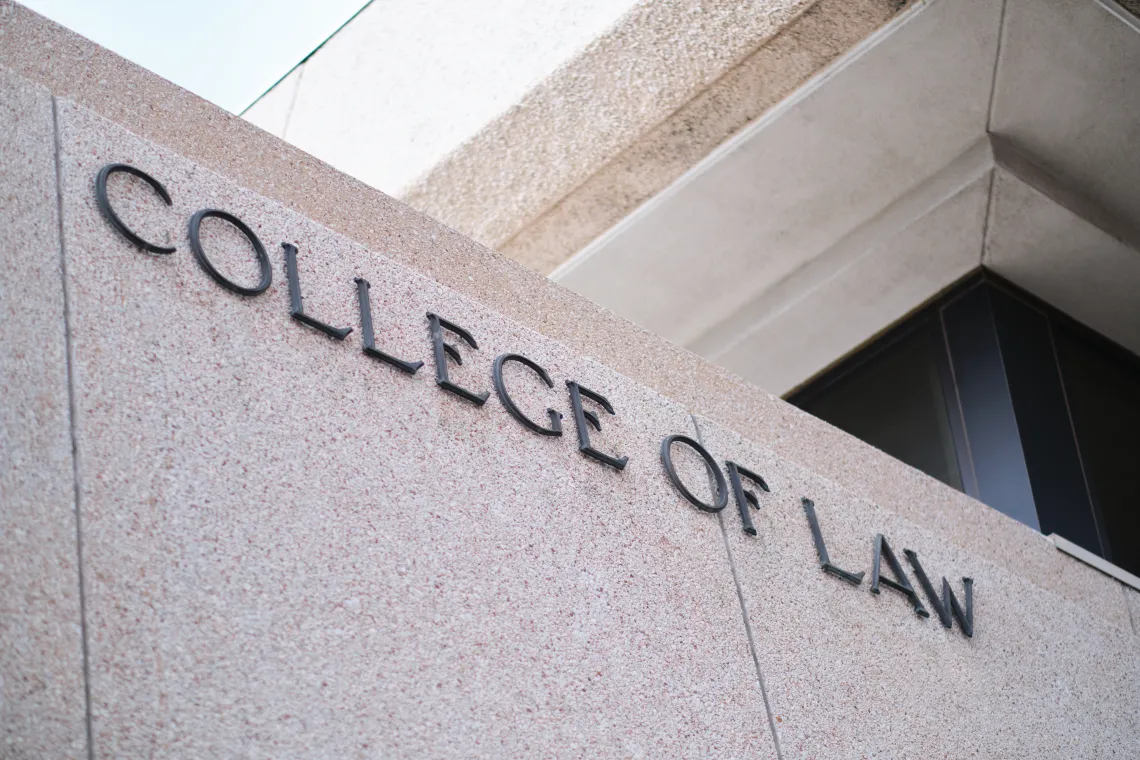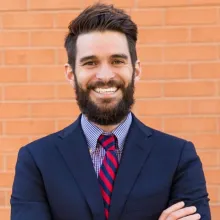University of Arizona Law Ranked #17th Among Public Schools for Scholarly Impact
"It comes as no surprise that Arizona Law continues to excel in scholarly impact,"

Once again, University of Arizona James E. Rogers College of Law faculty are among the most cited in the country. The college has been ranked 17th in the nation among public law schools and 38th overall for scholarly impact according to the newly released 2024 edition of the Sisk et al. study of scholarly impact, the leading citation ranking of law faculty.
The ranking is calculated from the mean and median citations to tenured faculty scholarship for the years 2019-2023, with more weight on mean impact. Schools that have a relatively high median score, such as University of Arizona Law, have strong research contributions from many faculty members rather than from only a few highly cited scholars. In median scholarly impact, University of Arizona Law ranks 26th in the nation.
“Working with our faculty every day, it comes as no surprise that Arizona Law continues to excel in scholarly impact," said Associate Dean for Research Andrew Coan. “From criminal law to family law, technology law, corporate law, international trade, and Indigenous peoples’ law, Arizona Law faculty are illuminating the most pressing issues of our time and advocating for a better future. Their work consistently places us among the top public law schools in the U.S.”
Five of the most-cited faculty for University of Arizona Law joined the college within the last decade, part of the college’s strategic efforts to recruit the most innovative and impactful scholars from across the legal academy. The professors listed specialize in a range of fields including environmental law, technology, criminal law, constitutional law, business law, Indigenous law and law and sexuality. Two eminent scholars from the college’s Indigenous Peoples Law and Policy program are among the group.
The top 10 most-cited faculty members from University of Arizona Law are (listed in alphabetical order):

Andrew Coan
Associate Dean for Research; Milton O. Riepe Chair in Constitutional Law; Director, William H. Rehnquist Center on the Constitutional Structures of Government
Andrew Coan teaches Constitutional Law, Federal Courts, and related subjects. In 2024, he was named Arizona Law's Distinguished Legal Scholar, an award that recognizes one outstanding faculty member per year for highly valued contributions to research and the intellectual life of the College. His book “Prosecuting the President” was a finalist for the ABA’s Silver Gavel Award.
Rationing the Constitution: How Judicial Capacity Shapes Supreme Court Decision-Making (Harvard University Press 2019).
Prosecuting the President: How Special Prosecutors Hold Presidents Accountable and Protect the Rule of Law (Oxford University Press 2019).
Dobbs v. Brown, Journal of American Constitutional History (2024).
What Is the Matter with Dobbs?, 26 University of Pennsylvania Journal of Constitutional Law 282 (2024).
Too Much, Too Quickly?, U.C. Davis Law Review (forthcoming 2024).
View his SSRN page.

Charles E. Ares Professor of Law; Co-Director of Environmental Law, Science & Policy Program
Engel teaches and researches in the areas of environmental and administrative law. Before entering academia, she was acting chief of the Environmental Protection Division of the Massachusetts Office of Attorney General and senior counsel for that office’s Public Protection Bureau.
Arizona’s Groundwater Management Act at Forty: Tackling Unfinished Business (co-authored with Esther Loiseleur & Elise Drilhon), 10 Arizona Journal of Environmental Law & Policy 187 (2020).
Micro-Motives for State and Local Climate Initiatives, 2 Harvard Law & Policy Review 119 (2008) (co-author, with Barak Y. Orbach).
Harnessing the Benefits of Dynamic Federalism in Environmental Law, 56 Emory Law Journal 159 (2006).
View her SSRN page.
Miller writes and teaches about environmental law and policy and criminal law and policy. He is the author of more than 70 articles and essays on a wide range of environmental, criminal justice, immigration and legal theory topics.
Criminal Procedures: Cases, Statutes & Executive Materials (6th Edition, co-authored with Ronald Wright, Kay Levine and Jenia Turner 2019).
The Screening/Bargaining Tradeoff (co-authored with Ronald Wright), 55 Stanford Law Review 29 (2002).
Biological Control: A Little Knowledge is A Dangerous Thing (co-authored with Gregory Aplet), 45 Rutgers Law Review 285 (1993).
View his SSRN page.

Barak Orbach
Robert H. Mundheim Professor of Law and Business, Director of Business Law Program
Orbach’s areas of expertise are antitrust, corporate governance, regulation, and the digital economy. In 2024, he received the Mallen Award, given annually recognize distinguished business and economics published works that make an extraordinary scholarly contribution to the field of motion picture industry studies.
The Friction Paradox: Intermediaries, Competition, and Efficiency, 68 Antitrust Bulletin 234 (2023)
Antitrust in the Shadow of Market Disruptions, 34 Antitrust 32 (2020).
Anything, Anytime, Anywhere: Is Antitrust Ready for Flexible Market Arrangements?, 20 Antitrust Source 1 (2021).
View his SSRN page.

Sergio Puig
Evo DeConcini Professor of Law; Director, International Trade and Business Law Program
Puig’s academic interests include topics related to international economic law, international arbitration, law and society, network analysis and the law and the legal profession. He is co-editor in chief of the Journal of International Economic Law and is the author of the book, “At the Margins of Globalization” (2021).
International Indigenous Economic Law, 52 U.C. Davis Law Review 1243 (2019).
Imperfect Alternatives: Institutional Choice and the Reform of Investment Law (co-authored with Gregory Shaffer), 112 American Journal of International Law 361 (2018).
Affiliation Bias in Arbitration (co-authored with Anton Strezhnev), 46 Journal of Legal Studies 371 (2017).
View his SSRN page.

Simone Sepe
Chester H. Smith Professor, Professor of Law and Finance
Sepe’s areas of expertise include business organizations, corporate finance, contract theory, law and economics, law and philosophy, and empirical methods. His main scholarship focuses on theoretical and empirical problems related to corporate governance, although he has recently expanded his research interest to contract law, the theory of institutions, and political philosophy.
Citizen Corp., 100 Washington University Law Review.
Contract Remedies for the New Economy Collaborations, 101 Texas Law Review (2023).
Blood in the Water: The Value of Anti-takeover Provisions During Market Shocks, 143 Journal of Financial Economics 1070 (2022).
The Nonrandom Walk of Knowledge, 37 Social Philosophy & Policy (2021).
View his SSRN page.

Rebecca Tsosie
Regents Professor and Morris K. Udall Professor of Law
Tsosie is widely known for her work in the fields of federal Indian law and Indigenous peoples’ human rights. She has published widely on sovereignty, self-determination, cultural pluralism, environmental policy and cultural rights. She teaches in the areas of federal Indian law, property, constitutional law, critical race theory and cultural resources law.
Tribal Data Governance and Informational Privacy: Constructing Indigenous Data Sovereignty, 80 Montana Law Review 229 (2019).
Indigenous Peoples and Epistemic Injustice: Science, Ethics, and Human Rights, 87 Washington Law Review 1133 (2012).
Indigenous Peoples and Environmental Justice: The Impact of Climate Change, 78 Colorado Law Review 1625 (Fall 2007).
Rethinking the Tribal Sovereignty Doctrine: Cultural Sovereignty and the Collective Future of Indian Nations (co-authored with Wallace Coffey), 12 Stanford Law and Policy Review 191 (2001).
View her SSRN page.

Robert A. Williams Jr.
Regents Professor, E. Thomas Sullivan Professor of Law; Faculty Co-Chair, Indigenous Peoples Law and Policy Program
Williams has represented tribal groups and members before the Inter-American Court of Human Rights, the Inter-American Commission on Human Rights, the United Nations Working Group on Indigenous Peoples, the United States Supreme Court and the Supreme Court of Canada.
Vampires Anonymous, 95 Michigan Law Review 741 (1997).
“Like a Loaded Weapon: The Rehnquist Court, Indian Rights, and the Legal History of Racism in America” (2005).
“Savage Anxieties: The Invention of Western Civilization” (2012).
View his SSRN page.

Andrew Keane Woods
Milton O. Riepe Professor of Law & Distinguished Legal Scholar
Woods’s research focuses on the global regulation of technology. He is the director of the TechLaw program at the University of Arizona College of Law. In the Spring of 2023, he was a visiting scholar at the University of Copenhagen on a Fulbright Schuman Innovation Award.
The New Social Contracts, 77 Vanderbilt Law Review (forthcoming).
Shallow Fakes (co-authored with Albertina Antognini), 128 Penn State Law Review 69 (2023).
Public Law, Private Platforms, 107 Minnesota Law Review 1249 (2023).
Litigating Data Sovereignty, 128 Yale Law Journal 328 (2018).
View his SSRN page.

Jordan Blair Woods
Professor of Law
Woods writes and teaches courses in the areas of criminal law and procedure, law and sexuality, family law and legal ethics. He is a co-director of the Family and Juvenile Law Certificate Program. His main areas of research focus on the regulation of law enforcement, criminal justice issues affecting LGBTQ populations, and the legal regulation of youth in family and child welfare contexts.
The New Sexual Deviancy, 113 Georgetown Law Journal (forthcoming 2025).
Reimagining Traffic Fines and Fees, 14 U.C. Irvine Law Review (forthcoming 2024).
Traffic Without the Police, 73 Stanford Law Review 1471 (2021).
Unaccompanied Youth and Private-Public Order Failures, 103 Iowa Law Review 1639 (2018) (winner of the Dukeminier Award recognizing best published LGBT legal scholarship).
View his SSRN page.

